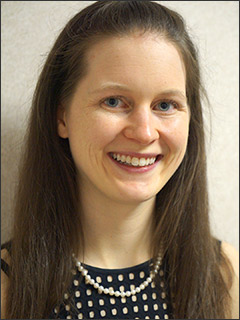2016 Student Research Grant in Early Childhood Language, 2017 New Century Scholars Doctoral Scholarship
Optimizing speech and language services for children with autism spectrum disorder
 First, a little history. When Jena McDaniel was in high school she was determined to learn sign language but she was too young to enroll by herself in the adult class she wanted. So she convinced her father to take the class with her.
First, a little history. When Jena McDaniel was in high school she was determined to learn sign language but she was too young to enroll by herself in the adult class she wanted. So she convinced her father to take the class with her.
Moving forward a few years, to 2016. McDaniel receives an ASHFoundation Student Research Grant in Early Childhood Language that funds her work examining audiovisual information for supporting word learning in children with hearing loss. The following year, now a PhD candidate at Vanderbilt University, she is awarded a new ASHFoundation honor, a 2017 New Century Scholars Doctoral Scholarship. McDaniel now has the ability to seriously focus on her research goals and on her professional future in the area of speech and language intervention for children.
"I believe that my work is very clinically relevant," says McDaniel. "I want to address the question, 'How do we know if what we are doing is working?' Our practice needs to be guided by evidence and I want to study treatments that are effective to support language development. We don't currently have a lot of direct evidence, particularly for special populations. We need to know what parts of our treatment are making a difference. It's my goal for speech-language pathologists and other professionals to think critically about the treatments they provide and how to make adaptations to meet a child’s specific needs."
McDaniel's work on her dissertation—she completed her PhD in May 2019—investigated the construct validity of vocalization measures for young children with autism spectrum disorder (ASD). She is interested in examining how we can see improvement in sound production by measuring incremental progress and is studying the vocalizations of this population for what might be early indicators of treatment response for children with ASD that could optimize the effectiveness of early intervention services. McDaniel recently accepted a position as a Postdoctoral Research Fellow at the University of Kansas where she will continue her line of research.
This type of treatment research, says McDaniel, "is very time-consuming and so extremely difficult to demonstrate why and how it will work." The ASHFoundation, however, took the leap of faith and awarded her the grant that helped her design her project using a reasonable budget and within a clear timeline, thus preparing her also for developing future, more broadly conceived research.
"My ability to complete my current work," adds McDaniel, "will also demonstrate to external funding agencies that I have the ability to be an investigator. The ASHFoundation uses evaluation criteria similar to those of the National Institutes of Health (NIH) and the Institute of Education Sciences, which is very helpful as I prepare for future grants. NIH reviewers also recognize the quality and rigor of the ASHFoundation review process."
And there was an added bonus to the 2017 ASHFoundation grant: receiving the award made McDaniel eligible to participate in ASHA's 2018 Lessons for Success program. Because of her participation, she says, "I feel much more confident and much better prepared for grant writing. In fact, thanks to what I've learned, I've already received two internal university grants and plan to apply for external support. But even more than these achievements, the ASHFoundation awards have given me something greater. I’m now a part of a community of professionals that care about people with communication disorders. That's the most rewarding part of being an ASHFoundation awardee."
View More Recipient Spotlights